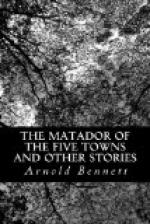“How do, Jos?” cried a couple of boys, cheekily. And then there were a few adult greetings of respect.
It was the hero, in haste.
“Out of it, there!” he warned impeders, between his teeth, and plugged on with bent head.
“He keeps the Foaming Quart up at Toft End,” said the doctor. “It’s the highest pub in the Five Towns. He used to be what they call a pot-hunter, a racing bicyclist, you know. But he’s got past that and he’ll soon be past football. He’s thirty-four if he’s a day. That’s one reason why he’s so independent—that and because he’s almost the only genuine native in the team.”
“Why?” I asked. “Where do they come from, then?”
“Oh!” said Stirling as he gently started the car. “The club buys ’em, up and down the country. Four of ’em are Scots. A few years ago an Oldham club offered Knype L500 for Myatt, a big price—more than he’s worth now! But he wouldn’t go, though they guaranteed to put him into a first-class pub—a free house. He’s never cost Knype anything except his wages and the goodwill of the Foaming Quart.”
“What are his wages?”
“Don’t know exactly. Not much. The Football Association fix a maximum. I daresay about four pounds a week Hi there! Are you deaf?”
“Thee mind what tha’rt about!” responded a stout loiterer in our path. “Or I’ll take thy ears home for my tea, mester.”
Stirling laughed.
In a few minutes we had arrived at Hanbridge, splashing all the way between two processions that crowded either footpath. And in the middle of the road was a third procession of trams,—tram following tram, each gorged with passengers, frothing at the step with passengers; not the lackadaisical trams that I had seen earlier in the afternoon in Crown Square; a different race of trams, eager and impetuous velocities. We reached the Signal offices. No crowd of urchins to salute us this time!
Under the earth was the machine-room of the Signal. It reminded me of the bowels of a ship, so full was it of machinery. One huge machine clattered slowly, and a folded green thing dropped strangely on to a little iron table in front of us. Buchanan opened it, and I saw that the broken leg was in it at length, together with a statement that in the Signal’s opinion the sympathy of every true sportsman would be with the disabled player. I began to say something to Buchanan, when suddenly I could not hear my own voice. The great machine, with another behind us, was working at a fabulous speed and with a fabulous clatter. All that my startled senses could clearly disentangle was that the blue arc-lights above us blinked occasionally, and that folded green papers were snowing down upon the iron table far faster than the eye could follow them. Tall lads in aprons elbowed me away and carried off the green papers in bundles, but not more quickly than the machine shed them. Buchanan put his lips to my ear. But I could hear nothing. I shook my head. He smiled, and led us out from the tumult.




